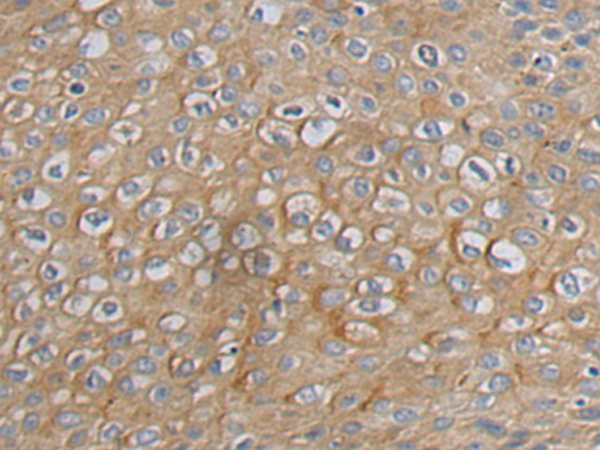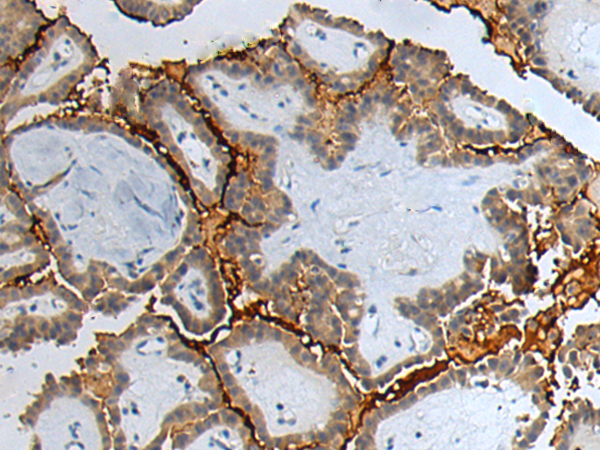

| WB | 咨询技术 | Human,Mouse,Rat |
| IF | 咨询技术 | Human,Mouse,Rat |
| IHC | 1/50-1/200 | Human,Mouse,Rat |
| ICC | 技术咨询 | Human,Mouse,Rat |
| FCM | 咨询技术 | Human,Mouse,Rat |
| Elisa | 1/5000-1/10000 | Human,Mouse,Rat |
| Aliases | B99 |
| Host/Isotype | Rabbit IgG |
| Antibody Type | Primary antibody |
| Storage | Store at 4°C short term. Aliquot and store at -20°C long term. Avoid freeze/thaw cycles. |
| Species Reactivity | Human, Mouse |
| Immunogen | Synthetic peptide of human GTSE1 |
| Formulation | Purified antibody in PBS with 0.05% sodium azide and 50% glycerol. |
+ +
以下是关于GTSE1抗体的3篇参考文献的简要概括示例:
---
1. **文献名称**:*GTSE1 regulates apoptosis and the cell cycle to promote tumorigenesis in breast cancer*
**作者**:Zhang Y, et al.
**摘要**:研究通过Western blot和免疫组化(IHC)分析GTSE1在乳腺癌中的表达,发现其过表达抑制细胞凋亡并促进G2/M期进展,且与患者生存率负相关。抗体用于检测组织样本中的蛋白定位及表达水平。
2. **文献名称**:*GTSE1 interacts with p53 to modulate its function in colorectal cancer*
**作者**:Bublik DR, et al.
**摘要**:利用免疫共沉淀(Co-IP)和免疫荧光技术,揭示GTSE1通过结合p53蛋白抑制其转录活性,促进结直肠癌细胞化疗抵抗。抗体用于验证GTSE1-p53相互作用及亚细胞定位。
3. **文献名称**:*High GTSE1 expression predicts poor prognosis and promotes metastasis in gastric cancer*
**作者**:Li X, et al.
**摘要**:通过IHC和体外实验,发现GTSE1在胃癌组织中高表达,并通过调控EMT通路增强侵袭转移能力。抗体的应用证实其表达与临床分期及预后显著相关。
---
以上内容为示例,具体文献需根据实际数据库检索结果调整。如需精确引用,建议通过PubMed或Web of Science以“GTSE1 antibody”为关键词进一步筛选。
The GTSE1 (G2 and S Phase-Expressed Protein 1) antibody is a tool used to study the expression and function of the GTSE1 protein, which plays a critical role in cell cycle regulation and cancer progression. GTSE1 is primarily expressed during the G2 and S phases of the cell cycle and is involved in DNA damage response, mitotic progression, and microtubule dynamics. It interacts with key regulators like p53. promoting its cytoplasmic sequestration and degradation, thereby inhibiting apoptosis and enabling cancer cell survival under stress conditions. Overexpression of GTSE1 has been linked to tumorigenesis, metastasis, and poor prognosis in various cancers, including breast, lung, and gastric cancers.
The GTSE1 antibody is widely employed in research to detect GTSE1 protein levels via techniques such as Western blotting, immunohistochemistry (IHC), and immunofluorescence (IF). It aids in understanding GTSE1's oncogenic roles, including its contribution to chemoresistance and metastasis by modulating epithelial-mesenchymal transition (EMT) and microtubule stability. Studies using this antibody have highlighted GTSE1 as a potential therapeutic target or biomarker for cancer diagnosis and treatment. Commercially available GTSE1 antibodies are typically validated for specificity and sensitivity, often generated in hosts like rabbits or mice using immunogenic peptide fragments. Ongoing research focuses on elucidating its molecular mechanisms and clinical relevance in oncology.
×